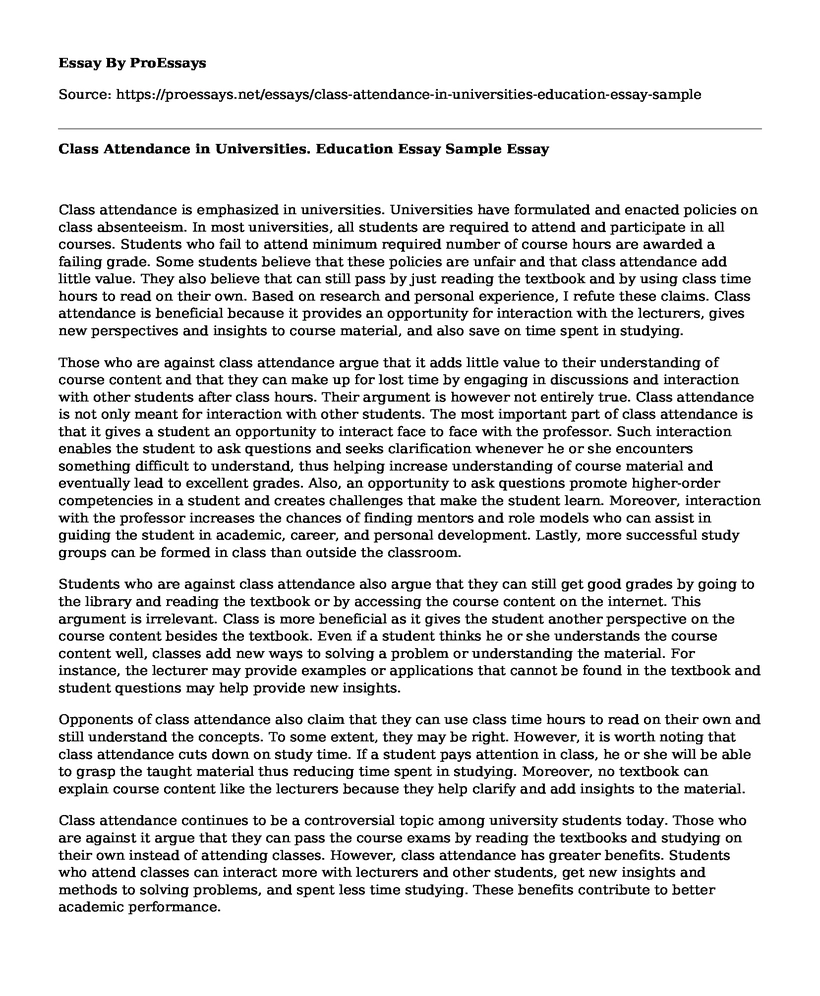Class attendance is emphasized in universities. Universities have formulated and enacted policies on class absenteeism. In most universities, all students are required to attend and participate in all courses. Students who fail to attend minimum required number of course hours are awarded a failing grade. Some students believe that these policies are unfair and that class attendance add little value. They also believe that can still pass by just reading the textbook and by using class time hours to read on their own. Based on research and personal experience, I refute these claims. Class attendance is beneficial because it provides an opportunity for interaction with the lecturers, gives new perspectives and insights to course material, and also save on time spent in studying.
Those who are against class attendance argue that it adds little value to their understanding of course content and that they can make up for lost time by engaging in discussions and interaction with other students after class hours. Their argument is however not entirely true. Class attendance is not only meant for interaction with other students. The most important part of class attendance is that it gives a student an opportunity to interact face to face with the professor. Such interaction enables the student to ask questions and seeks clarification whenever he or she encounters something difficult to understand, thus helping increase understanding of course material and eventually lead to excellent grades. Also, an opportunity to ask questions promote higher-order competencies in a student and creates challenges that make the student learn. Moreover, interaction with the professor increases the chances of finding mentors and role models who can assist in guiding the student in academic, career, and personal development. Lastly, more successful study groups can be formed in class than outside the classroom.
Students who are against class attendance also argue that they can still get good grades by going to the library and reading the textbook or by accessing the course content on the internet. This argument is irrelevant. Class is more beneficial as it gives the student another perspective on the course content besides the textbook. Even if a student thinks he or she understands the course content well, classes add new ways to solving a problem or understanding the material. For instance, the lecturer may provide examples or applications that cannot be found in the textbook and student questions may help provide new insights.
Opponents of class attendance also claim that they can use class time hours to read on their own and still understand the concepts. To some extent, they may be right. However, it is worth noting that class attendance cuts down on study time. If a student pays attention in class, he or she will be able to grasp the taught material thus reducing time spent in studying. Moreover, no textbook can explain course content like the lecturers because they help clarify and add insights to the material.
Class attendance continues to be a controversial topic among university students today. Those who are against it argue that they can pass the course exams by reading the textbooks and studying on their own instead of attending classes. However, class attendance has greater benefits. Students who attend classes can interact more with lecturers and other students, get new insights and methods to solving problems, and spent less time studying. These benefits contribute to better academic performance.
Cite this page
Class Attendance in Universities. Education Essay Sample. (2021, Mar 26). Retrieved from https://proessays.net/essays/class-attendance-in-universities-education-essay-sample
If you are the original author of this essay and no longer wish to have it published on the ProEssays website, please click below to request its removal:
- Challenges Faced By International Students in Toronto
- Teaching Methods Essay Example
- Addressing Obesity Amongst College Students Essay
- The Relationship Between Socio-Economic Status and Early Childhood Development - Essay Sample
- Essay Sample on Teacher Diversity: A Growing Need For Cultural Competency In Schools
- For-Profit Colleges: Quality Education, Positive Returns for Shareholders - Essay Sample
- Essay on Providing Condoms at Christian Colleges: A Matter of Safety, Not Morality







